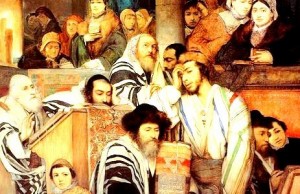M y lovely mother, God bless her, is cursed. And having just spent a weekend with her brother, I can safely claim that he’s cursed, too. Maybe “cursed” is too soft a diagnosis, as my siblings and I have often jokingly wondered if with Mom it’s actually a case of outright demonic possession: does she have a demon who attacks her facility with all things technological?
y lovely mother, God bless her, is cursed. And having just spent a weekend with her brother, I can safely claim that he’s cursed, too. Maybe “cursed” is too soft a diagnosis, as my siblings and I have often jokingly wondered if with Mom it’s actually a case of outright demonic possession: does she have a demon who attacks her facility with all things technological?
Computers, cellphones, printers and TVs—you name it. Entertainment systems and the remote controls that come with them? Don’t get me started. If it’s a demon in Mom, or one with many offspring in all her appliances, it’s one that wants to draw the line at her electric toothbrush.
Yes, there’s a generational component in play. But might even that be more about generational sin, a legacy of dysfunctionality born long ago when our mechanically challenged ancestors quickly gave up on the frustrating task of turning the family swords into plowshares? Because in lesser but definite ways I, too, have been cursed.
Long before the iPod and iPad came around, I was sold the iCan’t and iDon’t.
For years I chalked up this quality to my Luddite leanings in a cyberfrenentic world. I was among the last of my friends to adopt e-mail or a cellphone, then among the last to adopt a smartphone. I hated the constant OS updates on my laptop, happy to stick with House Cat or whatever it was called while everyone else moved on to Snow Leopard and Mountain Lion.
Then what should have been a routine exercise turned first into a nightmare, then something of an exorcism.
To make a long and fairly boring story short, I was on the phone with AT&T before a sabbatical overseas when an agent from tech “support” (in this case “abuse”) had me restore my phone to factory settings without first creating a backup. Presto! Everything was gone when the phone booted back up, with additional casualties on my laptop in the process. Thus began a downward spiral of increasingly futile proportions, with AT&T in one ear and Apple in the other, each hoping to disown the problem until a series of hand-offs at Apple left me on the line with a man of angelic dimensions fittingly named Michael.
In keeping with the self-evident title of Brett T. Robinson’s Appletopia: Media Technology and the Religious Imagination of Steve Jobs, this Michael was truly an Archangel assigned to cases like mine. As a Tier 2 Advisor at Apple, he ruled a domain that nine out of ten of our standard tech support calls never ascend to.
And make no mistake: for this Michael, the attempt at restoration and recovery of all that had been lost was nothing short of a battle in ethereal realms on his part, with secondary forces pulled in over the phone from other parts of the country. He was determined to win, much like his biblical namesake when entangled with the Prince of Persia in the Book of Daniel.
At least that’s where my mind went over the course of our hours-long call, while his simply went to the problem at hand.
But it was the perfect occasion to let my old-man Luddite die off and be replaced with a born-again technophile—or at least the fetal beginnings of one and perhaps only in theory—who has had a revelation of the fascinating parallels between the spiritual and technological realms.
Let’s start with sheer semantics, wherein analogues abound. Restore. Save. Submit. Agree. Send. The commands we give on our devices a perfect echo of the ones we are given by our Deity. Restart. Refresh. Force Quit. Return.
Hence the design of computer hardware and software based on human “wetware,” our cellular processes that model computer processing and, well, cellular communication. Watch Stephen Meyer’s DNA by Design, and whatever your beliefs or lack thereof, you will likely come away amazed to learn that the human genome operates much like the system of folders within folders on your PC, replete with self-correcting enzymes that traverse the endless sequences of DNA to repair bugs in the code.
All of which is to say that if we are made in God’s image, then computers are made in ours.
“In the beginning was the code,” Jürgen Schmidhuber, co-director of the Swiss AI lab IDSIA, famously proclaimed at a 2012 TEDx talk in which he addressed the increasingly popular belief among scientists that the universe not only operates like a computer, but in a sense is one.
More recently, the New York Times raised the same question with an article titled, “Is the Universe a Simulation?” In it author Edward Frankel summarizes the surreal hypothesis:
But one fanciful possibility is that we live in a computer simulation based on the laws of mathematics—not in what we commonly take to be the real world. According to this theory, some highly advanced computer programmer of the future has devised this simulation, and we are unknowingly part of it. Thus when we discover a mathematical truth, we are simply discovering aspects of the code that the programmer used.
Yet doesn’t the very question of such a programmer, small “p,” beg the painfully glaring question of a Programmer, capital “P” instead? I go through my doubts about the existence of God, sure; but a teenage gamer from the future playing his philosophical shoot-’em-up called Planet Earth?
If that’s conceivable, I would imagine that so is Paul’s alternative paradigm as described in his letter to the Ephesians: “For we are His workmanship, created in Christ Jesus for good works, which God prepared beforehand so that we would walk in them.”
Translate that into the vernacular of computer science, and perhaps you get a program called Free Will—but one overcome with the virus of sin.
Surely we are surrounded by so great an iCloud of witnesses.
Bradford Winters is a screenwriter/producer in television whose work has included such series as Oz, Kings, Boss, and The Americans. His poems have appeared in Sewanee Theological Review, Spoon River Poetry Review, and Georgetown Review, among other journals. He lives in Brooklyn with his wife and three children.











